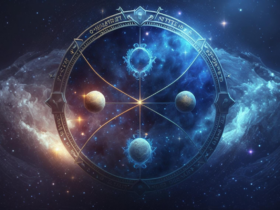Humanity has long been captivated by the mysteries of existence. From the dawn of civilization, we have sought answers to life’s most profound questions: Who are we? Why are we here? What does the future hold? One ancient system that claims to offer insights into these enigmas is astrology. Though often dismissed as a pseudoscience, astrology continues to fascinate millions around the world, providing a unique lens through which to explore the complexities of human life.
Astrology is the study of the movements and relative positions of celestial bodies interpreted as having an influence on human affairs and the natural world. At its core, astrology posits that there is a meaningful connection between the patterns of the cosmos and the events on Earth. This belief is encapsulated in the ancient maxim “as above, so below,” suggesting that the macrocosm of the universe is reflected in the microcosm of individual human experience.
One of the fundamental aspects of astrology is the natal chart, also known as a birth chart or horoscope. This chart is a snapshot of the sky at the exact moment and location of a person’s birth, mapping the positions of the sun, moon, planets, and other celestial points. Astrologers interpret these positions to provide insights into a person’s personality, strengths, weaknesses, and life path.
Many turn to astrology during times of uncertainty or when faced with significant life questions. For instance, someone experiencing a career crisis might consult their natal chart to understand their professional inclinations and potential opportunities. Similarly, individuals grappling with relationship issues often seek astrological guidance to comprehend compatibility and emotional dynamics. In this way, astrology serves as a tool for self-reflection, helping people make sense of their experiences and decisions.

Astrology also offers a perspective on the concept of destiny. While some interpretations suggest that the stars determine our fate, contemporary astrology often emphasizes the idea of potential rather than predestination. It proposes that while the cosmic influences are significant, individuals possess free will to shape their own destinies. The stars might guide, but they do not compel.
Related: How Witches Use Tarot to Connect with the Spirit World
Furthermore, astrology touches upon the philosophical question of interconnectedness. By linking the movements of distant celestial bodies to personal events, astrology underscores the idea that everything in the universe is interrelated. This holistic viewpoint resonates with many spiritual and philosophical traditions, which advocate for a deep, intrinsic connection between all forms of existence.
Critics argue that astrology lacks empirical support and cannot be scientifically validated. However, its enduring popularity suggests that many find value in its insights, regardless of scientific legitimacy. For believers, astrology offers a sense of meaning and connection, providing a framework to understand the chaos of life and the universe.
In exploring life’s big questions, astrology invites us to consider the possibility that we are part of a larger, intricate cosmic tapestry. Whether one views it as a profound truth or a captivating metaphor, astrology remains a compelling tool for navigating the mysteries of existence, prompting us to look both outward to the stars and inward to our own hearts for answers.





















